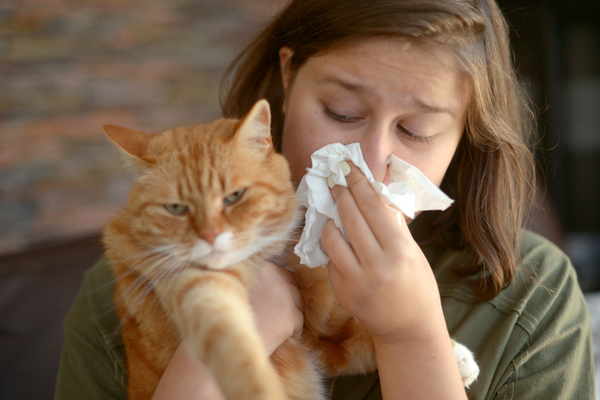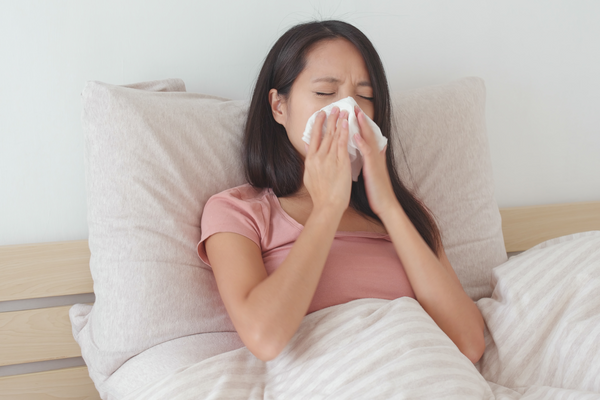What You Need to Know About Your Baby’s Delicate Skin

Is there anything more aww-inducing than snuggling a newborn? The velvety feel of baby’s soft, plump skin and their magical baby scent can make anyone melt with joy. Your baby’s oh-so-soft skin is still developing, however, throughout their first year of life. This makes babies more susceptible to damage from irritants, allergens, and germs. Most infants will experience some sort of skin irritation before their first birthday, whether or not they have allergies or sensitivities. In short, a baby’s skin is much more sensitive than an adult’s, and skin conditions like cradle cap or eczema can crop up in the months after birth.
The good news? You don’t have to swaddle your baby in protective bubble wrap until they’re in kindergarten (though that would be super convenient). Instead, follow a few simple rules on caring for baby’s sensitive skin.
Why Is Baby’s Skin More Sensitive Than Adults?
Our skin is a big deal––literally. It’s the largest organ in the body and also one of the most complicated. Not only does skin hold everything in, but it also plays a critical role in providing an airtight, watertight, and flexible barrier between the outside world and the highly regulated systems within the body. The skin is unique in so many ways! Human skin has the same structure and performs the same essential functions at every stage of life. These functions include:
- Providing a protective barrier against harmful pathogens and chemicals
- Preventing loss of moisture
- Reducing the detrimental effects of UV radiation
- Regulating the body temperature
- Synthesizing Vitamin D
- Assuring the proper synthesis of hormones
- Acting as a sensory organ (touch, detects temperature)
When our skin is healthy, its layers work incredibly hard to protect us. But when it’s compromised, the skin’s ability to work as an effective barrier is impaired. Although your baby’s skin has the same basic structure as yours, it is still developing and more vulnerable to damage.
Here are five key differences between your baby’s skin and yours:
Baby’s skin is more permeable.
Our skin’s most essential job is keeping the outside world out of our bodies. However, a baby’s still-developing skin acts more like a sieve than a protective barrier, with a structure that allows more substances through than adult skin does. Additionally, the top layer of a baby’s skin (the epidermis) isn’t as firmly attached to the layer below (the dermis). This means that unlike an adult, whose epidermis and dermis are tightly sealed together, a baby’s epidermis allows substances through much more easily. And while your baby’s skin can feel plump and squeezable, it’s actually much thinner than yours. In fact, a baby’s epidermis is three to five times thinner than an adult’s and comprises smaller cells, which increases the absorption of water and other substances into the body. Not to mention, baby’s adorable chubbiness results in a much larger surface area of skin, usually between three to five times greater than an adult’s, relative to body weight. Since the skin absorbs irritants, allergens, and bacteria from the environment, a substance that manages to penetrate the skin ends up being considerably more concentrated in an infant’s body.
How you can help protect your baby’s delicate skin: Choose the products you use in your home carefully and wisely. When shopping for household products, beauty products, and skincare products, avoid ingredients like synthetic fragrances, dyes, phthalates, sulfates, parabens, alcohol, and bleach, whenever possible.
Baby’s skin is more susceptible to irritation.
Your baby’s delicate skin has a pH close to neutral at birth. As we age, our skin gradually becomes more acidic. By protecting your baby’s natural pH, you’ll help support healthy skin early in life.
How you can help protect your baby’s delicate skin: Less is more when it comes to baby care products like soaps, bubble baths, and laundry detergents––less fragrance, less dyes, less harsh chemicals. Using these harsh ingredients can disturb the pH of your infant’s skin and make it prone to irritation, inflammation, excessive dryness, and damage. Nanette Silverberg, MD, Chief of Pediatric Dermatology for Mount Sinai Health System in New York City, advises new parents to look for gentle ingredients when shopping for baby detergents and soaps.
Related: Is Just-For-Baby Laundry Detergent Necessary?
Baby’s skin is less able to retain moisture.
It’s totally normal for newborns to have peeling, dry skin during the first few weeks of life. While newborn skin can absorb water well, it cannot efficiently hold onto moisture due to the not-yet-developed skin barrier. And while older babies quickly develop skin that’s better hydrated than adults, moisture levels still fluctuate more, especially for babies with sensitive skin or eczema.
How you can help protect your baby’s delicate skin: Work with your pediatrician to provide your baby with good hydration and adequate fluids. Many infants benefit from the use of quality moisturizers––just be sure to steer clear of products with harsh ingredients like synthetic fragrance and dyes. Generally, moisturizer works best when applied to wet skin, ideally within two minutes after a bath or on damp skin.
Baby’s skin is less able to regulate body temperature.
Babies, especially newborns, are not as adept at regulating their body temperature. While adult blood vessels in the lower layer of the skin (the dermis) widen or narrow to regulate body temperature, baby’s still-developing dermis cannot react as adeptly. Therefore, parents and caregivers must be proactive about managing factors that can affect body temperature. For example, avoid dressing baby in layers on a hot day. Instead, dress your baby in breathable layers to help regulate their body temperature. It’s important to note that infants also have fewer sweat glands, so they can’t sweat to cool down like adults.
How you can help protect your baby’s delicate skin: It’s essential to help regulate your baby’s body temperature for them. If baby gets overheated, be sure to cool them down right away. Overheating can result in skin irritation, rashes, and more.
Baby’s skin is more vulnerable to sun damage.
Babies and toddlers produce less melanin, which leads to more sensitivity to the sun. There has been debate about the use of sunscreens on infants whose skin is not developed enough to absorb and distribute the chemicals found in most sunscreen properly. Based on several studies on this topic, the American Academy of Pediatrics (AAP) recommends avoiding the use of sunscreen in babies younger than six months old and instead relying on protective clothing.
How you can protect baby’s sensitive skin: Be sun safe! Whenever possible, avoid the midday sun, dress your baby in sun-protective clothing and hats, keep baby in the shade, use UVA-blocking sunglasses, and use broad-spectrum zinc oxide or titanium dioxide sunscreen of at least SPF 15 for children older than six months.
The Ecology Works: Creating a Clean & Healthy Home Environment for Baby
Skin is the first line of defense for the human body, and your baby needs your help to maintain that defense during the first few years of life. Avoiding sun exposure, keeping baby in temperature-appropriate clothing, supplementing skin hydration with quality moisturizer, and avoiding harsh chemicals around your home are all things you can do to protect baby’s delicate skin. At The Ecology Works, the well-being of people and the planet are at the forefront of all that we do. Our products are free from unnecessary ingredients and were formulated with our customers and our own families in mind.
Vital Oxide, our all-purpose cleaner and disinfectant, is ideal for use in all areas of the home and is gentle enough to use around babies and pets. It’s free from harsh chemicals and contains no added fragrance or dyes.

From cloth diapers and bedding to baby’s many onesies, it’s important to wash the fabrics their skin will come into contact with using a gentle, dye-free, fragrance-free detergent. Regular laundry detergents are too harsh and can cause skin irritation, diaper rash, allergic reactions, and more. Instead, wash your baby’s clothes and linens with a plant-based, fragrance-free detergent that’s made for sensitive skin. Our Anti-Allergen Laundry Detergent is hypoallergenic and free from perfumes, dyes, or enzymes that can irritate your baby’s delicate skin. It’s recommended by allergists and dermatologists and is also 100% biodegradable, making it an Earth-friendly choice.

Have questions about reducing allergens inside your home or business? We have answers! The Ecology Works has been helping folks with allergies and asthma since 1993. We can help you select the products you need to live a better, allergen-free life. Please feel free to Contact Us or message us on Facebook. No question is too small! We're here to help.





